|
|
|
Sort Order |
|
|
|
Items / Page
|
|
|
|
|
|
|
| Srl | Item |
| 1 |
ID:
116491
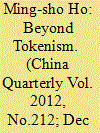

|
|
|
|
|
| Publication |
2012.
|
| Summary/Abstract |
This article challenges the accepted view that during the period of martial law Taiwan's labour unions were "a useless token." Focusing on the petroleum and sugar industries, I analyse the incremental process of how party-state control over the labour unions was converted by the workers themselves in Taiwan's national enterprises. In the early 1950s, the KMT's policy of unionizing enterprises was a complementary strategy to reinforce its slow and unsuccessful party-state penetration. With the unions' prominent role in welfare provision, workers were encouraged to develop a sense of stakeholdership. Over the years, labour unions legitimatized the interests of worker members and thus gave rise to an explosion of claim-making activities - what I call "petty bargaining." By the mid-1980s, labour unions, although still dominated by the KMT, were no longer a Leninist transmission belt, but rather functioned as a de facto complaint centre - an often overlooked precondition for the rise of post-1987 independent labour unionism.
|
|
|
|
|
|
|
|
|
|
|
|
|
|
|
|
| 2 |
ID:
116489
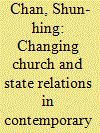

|
|
|
|
|
| Publication |
2012.
|
| Summary/Abstract |
This study examines church-state relations in Mindong diocese, Fujian province, from the perspective of state-society relations. The article seeks to identify the salient patterns of church-state relations in Mindong diocese, and the social factors that contribute to the formation of such patterns. I elaborate on the essential characteristics of the Mindong model in the paper. I argue that the three key factors affecting church-state relations in Mindong diocese are the competition between the open and underground churches, the mediating role of the Vatican, and the pragmatism of local government officials. I describe the Mindong model as a "negotiated resistance," meaning that the underground church resists the control of the government and seeks organizational autonomy through continued negotiation with officials of the government. In conclusion, I discuss the implications of this church-state model in advancing religious freedom in Chinese society.
|
|
|
|
|
|
|
|
|
|
|
|
|
|
|
|
| 3 |
ID:
116492
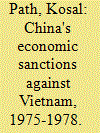

|
|
|
|
|
| Publication |
2012.
|
| Summary/Abstract |
This article carries a two-fold argument. First, Beijing's economic sanctions against Vietnam during the period 1975-1978 were mainly motivated by its desire to punish Vietnam for an anti-China policy that smacked of ingratitude for the latter's past assistance, fuelled further by Hanoi's closer relations with Moscow. They were also designed to extract Hanoi's accommodation of China's demand for territorial boundary concessions and to halt the persecution of ethnic Chinese residents in Vietnam. Second, the resultant meltdown of Sino-Vietnamese relations, as well as the making of the Soviet-Vietnamese alliance between 1975 and 1978, was gradual and contentious rather than swift and decisive as most existing studies contend. Hanoi's reluctance to forge a formal military alliance with the faraway Soviet Union against China was largely driven by the importance of China's remaining aid and economic potential to Vietnam's post-war economic reconstruction and the uncertainty of the Soviet commitment to aid Vietnam.
|
|
|
|
|
|
|
|
|
|
|
|
|
|
|
|
| 4 |
ID:
116490
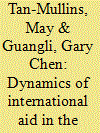

|
|
|
|
|
| Publication |
2012.
|
| Summary/Abstract |
Environmental degradation in China, intensified by open-door reforms and industrialization, has been increasing at an alarming scale. Domestically, environmental governance has been poor, often due to institutional constraints and lack of "good practices." However, recently there have been studies on how the "foreign factor" might have profound positive effects on capacity building in China and how international actors could lead to the successful introduction of good environmental governance. In this article, we present a study of a successful case: the World Bank Global Environmental Facility Cixi Wetlands project in Ningbo, China. The article examines the following: (a) the unique local context enabling the diffusion of international norms; (b) the factors which contribute to the World Bank's leverage role in restructuring local project governance; and (c) the changes in local environmental governance arising from the Bank's involvement. By evaluating this project, the article will demonstrate how the World Bank managed to introduce and socialize local actors into project-specific policy dialogues and procedures that enhanced local compliance with its international practices and standards.
|
|
|
|
|
|
|
|
|
|
|
|
|
|
|
|
| 5 |
ID:
116494
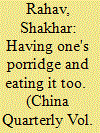

|
|
|
|
|
| Publication |
2012.
|
| Summary/Abstract |
This article examines the "porridge incident," in which the renowned Chinese author, critic and former minister of culture Wang Meng sued a Communist Party literary journal for attacking him and his story "Hard Porridge" ("Jianying de xizhou"). The incident straddled the transitional period between 1989 and 1992 and illuminates the ramifications of structural changes in China's literary sphere. I frame the affair within two contexts: Wang Meng's tortuous career, which challenges dichotomies of bureaucrat vs. dissident, and the transition from a centralized literary sphere to a market-driven one. I argue that Wang's responses to the attack on him stemmed from a political and cultural standing that was the product of a Party-controlled cultural sphere, along with the opportunities offered by expanding reforms. The Deng-era reforms produced a divide between culture, markets and bureaucracy that would preclude cultural figures like Wang from holding such high bureaucratic positions anymore.
|
|
|
|
|
|
|
|
|
|
|
|
|
|
|
|
| 6 |
ID:
116487


|
|
|
|
|
| Publication |
2012.
|
| Summary/Abstract |
This paper argues that the low-income housing programme in China has so far failed to provide adequate housing for the poor for three main reasons: the central government's failure to define a clear mission; a lack of commitment from local governments; and an exclusionary policy towards migrants. A systematic review of low-income housing policy in China shows that the central government juggles its economic and socio-political goals thereby causing constant changes in low-income housing policy. Meanwhile, the existing public finance system, the performance evaluation system and localization in policy implementation have all resulted in a lack of commitment from local governments to low-income housing. Inadequate provision is made worse by problems with allocation. Despite encouraging changes since 2010, many factors underlying the government's failures remain unchanged, thus the fate of low-income housing remains uncertain.
|
|
|
|
|
|
|
|
|
|
|
|
|
|
|
|
| 7 |
ID:
116485


|
|
|
|
|
| Publication |
2012.
|
| Summary/Abstract |
China experienced extensive civil strife in 1974, as elite factionalism during the "criticize Lin Biao and Confucius" campaign revived popular contention in the provinces. Past research has characterized these conflicts as a "second Cultural Revolution" - an offensive by resurgent red guards and rebels to resist the restoration of purged civilian officials to powerful posts. In Nanjing, however, the conflicts were of an entirely different nature. Civilian cadres directed the campaign against army officers who still dominated civilian government throughout the province. Popular protests in Nanjing were not led by former rebels, whose ranks had been decimated by unusually harsh military suppression campaigns, but were instead protests by ordinary citizens who had suffered in the purges and rustication campaigns of the late 1960s. While the campaign in cities like Hangzhou and Wuhan was an offensive by resurgent rebels against civilian officials, in Nanjing civilian officials used the campaign to ensure their victory over military rivals. The Hangzhou and Wuhan pattern revived the politics of the 1960s, while the Nanjing pattern anticipated the protests against Cultural Revolution abuses characteristic of the end of the Mao era.
|
|
|
|
|
|
|
|
|
|
|
|
|
|
|
|
| 8 |
ID:
116488
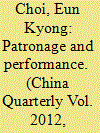

|
|
|
|
|
| Publication |
2012.
|
| Summary/Abstract |
This paper attempts to estimate the impact of both factional ties and economic performance on the promotion of provincial Party secretaries and governors by analysing a person-year dataset of their career mobility for inclusive years 1989 to 2009. We found that for provincial Party secretaries whose promotion meant rising to a top national position, both factional ties and good economic performance increased their chance for promotion. On the other hand, for provincial governors whose promotion meant rising to a ministry-level position, only economic performance mattered for their promotion. Among provincial Party secretaries, the extent to which performance affected the likelihood of promotion was not different between factional members and non-members. This suggests that even factional members needed to show good performance to enhance the likelihood of their promotion.
|
|
|
|
|
|
|
|
|
|
|
|
|
|
|
|
| 9 |
ID:
116486
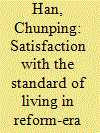

|
|
|
|
|
| Publication |
2012.
|
| Summary/Abstract |
Popular satisfaction with current standards of living in reform-era China is explored in this article, using survey data from the 2004 China Inequality and Distributive Justice Project. Three major patterns are found: first, people of rural origin, with low levels of education and living in the west region, who are disadvantaged in the inequality hierarchy, report greater satisfaction with current standards of living than do privileged urbanites, the highly educated and residents in the coastal east. Second, inequality-related negative life experiences and social cognitive processes including temporal and social comparisons, material aspirations, and life goal orientations mediate the effects of socioeconomic characteristics. Third, the social sources of satisfaction with current standards of living vary across urban, rural and migrant residents. It is suggested that these patterns have largely stemmed from the unique political economic institutional arrangement and stratification system in China.
|
|
|
|
|
|
|
|
|
|
|
|
|
|
|
|
| 10 |
ID:
116493
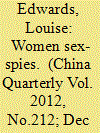

|
|
|
|
|
| Publication |
2012.
|
| Summary/Abstract |
This article examines 70 years of debate about Ding Ling's 1941 influential short story about a woman spy, "When I was in Xia Village." In the article I show that the re-absorption of "our" female spies into post-conflict solidarity narratives is a fraught process. For national governments, the difficulty lies in asserting the moral legitimacy of their rule in the face of evidence about their deployment of women as sex spies. For national populations, the difficulty lies in the desire to construct reassuring victory stories within which peacetime normalcy can be restored. The diverse exegeses around Ding Ling's "Xia Village" reveal that even decades after the hostilities cease, "our" women sex spies still require an explanation to communities seeking to consolidate or "remember" their national virtue. The evolution of this process of "explaining" reveals the on-going importance of sexual morality to governance in current-day China. Specifically, through the analysis of the critiques of "Xia Village" the article demonstrates that female chastity has been and continues to be an important commodity in establishing and sustaining popular perceptions of the moral virtue of the PRC as a nation, and the CCP as its legitimate government.
|
|
|
|
|
|
|
|
|
|
|
|
|
|
|
|
|
|
|
|
|